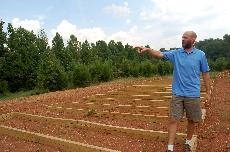The fall semester was kick started by an assortment of environmentally sustainable changes made to campus that will fundamentally enhance and promote green living at Guilford. As the old saying goes, while the students are away Jim Dees will play. This past summer, Jim Dees, the environmental sustainability coordinator, along with the other representatives of the Sustainability Council and Facilities delved into several of the many projects designed to make Guilford more environmentally sustainable.
One catalyst of the green transformations transpired in spring 2007 when President Kent Chabotar penned his name to the President’s Climate Commitment, thus pledging Guilford College to be carbon neutral in the future.
“We’re not changing what we do, but how we do what we do,” said Dees. “It is our job to assist in this cultural shift of living green, and that’s what we are doing.”
The most detectable renovation can be seen in the dining hall. Along the ceiling, the array of dispersed skylights is an energy-efficient shift, which allows for pure solar energy to flood the dining hall, no electricity required.
Jon Varnell, the associate vice president of operations and facilities, reminisced about the installation of the skylights.
“It was like the bright light of heaven flooded in, and I couldn’t have been more excited,” said Varnell. “For me, that was the ‘ah’ moment.”
Besides the new ambiance, the dining hall has begun to compost as well. With the aid of a particularly handy device dubbed “the pulper,” the dining hall is able to compress 70-80% of food waste.
The composted material will then be transferred to the earth tub. Eight feet long, the tub will hold the composted material, which after a period of at least three days will be moved to a lot behind the Facilities building to be used at a later date.
“I’m juiced about the sustainability initiatives on campus,” said Mac McBee, Meriwether Godsey sustainability manager. “There is so much we have to look forward to, and this is only the beginning.”
Another initiative is the creation of the dining hall’s own personal herb garden. Located behind Founders Hall, this garden will include a wide assemblage of herbs, flowers, even blueberry bushes and a fig tree. Meriwether Godsey will then prepare and serve the garden’s products in the dining hall.
An enterprise that more directly targets specific Guilford students on campus is the decision to fine students who live either in the South Apartments or any of the alternative houses that exceed a certain amount of energy usage per month.
Calculations were made of the average amount of wattage usage per month based on energy records from the past three years. From this then, an average amount was determined, and students who surpass their allotted amount will be fined the excess cost.
“We’ve all made compromises,” commented sophomore and resident of Cobb House, Jenny Gundersdorff. “My roommates and I cut corners where we can, so I don’t think that the adjustment should be too hard.”
Furthermore, anyone who has treaded through Guilford’s meadows may have noticed yet another endeavor in process. Gold, wood boards have been set into large domino-like placements flanking the gazebo and neighboring a hidden enclave of honey bees to make way for a community garden.
With the garden still in the early stages, its overseer, Jim Dees, is both proud and passionate about this project’s potential.
“We are so lucky to have this campus at our disposal, especially in the middle of a city,” said Dees. “Anyone can volunteer and help with the garden’s development, and we hope to neighbor with the Greensboro community to really make this garden a success.”
Organic gardening has become a high priority, because not only will it be able to reduce Guilford’s carbon footprint, but the produce from the garden will also be sold at a fair price back to Meriwether Godsey.
“This is about crafting a new lifestyle for the Guilford community,” said Varnell. “We have so much to be proud of, and with further research and partnerships we can construct an environmentally sustainable campus.”
When asked what other future green projects were to come, a smiling Dees responded, “Oh golly, there’s always more.

